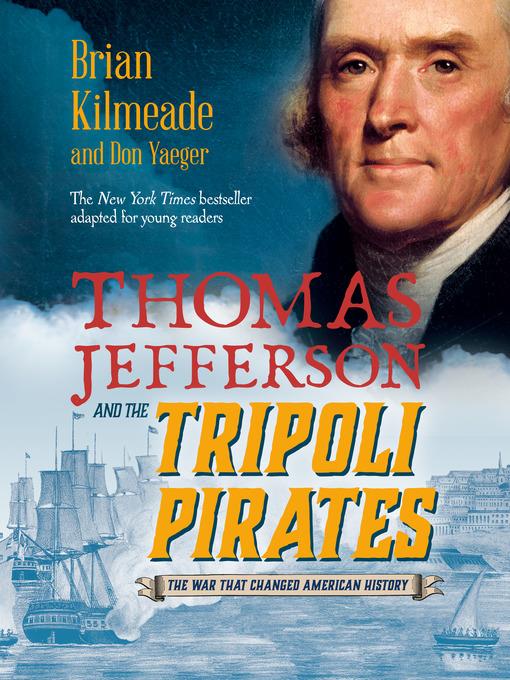
Thomas Jefferson and the Tripoli Pirates
کتاب های مرتبط
- اطلاعات
- نقد و بررسی
- دیدگاه کاربران
نقد و بررسی

January 15, 2020
The slimmed-down version of a 2015 account of the United States' first war with the "Mohammedan world." Casting the Muslim lands of what were then dubbed the "Barbary States" as our young country's "first enemy," Fox News commentator Kilmeade and co-author Yaeger, who previously collaborated on George Washington's Secret Six (2015) recount the course of this first, indecisive clash from the capture of the merchant ship Dauphin in 1785 to the 1805 treaty with the bashaw of Tripoli. (The second, more permanent clash in 1815 is covered in a brief footnote.) Jefferson was secretary of state and president for much of that period, but he seems rather dragged into the episode, coming off as a strong voice for a military solution to the conflict but never directly involved in events or negotiations. Moreover, though much is made of how captured American crews were enslaved by the treacherous, greedy local deys, there is no mention that Jefferson himself was a slaveholder. As the treaty was not won in battle, the authors deem it "tainted, but the conflict did demonstrate that "Americans were not to be trifled with" and allowed the U.S. to feel that "military force had helped regain national honor." Small, sparse period illustrations are sometimes irrelevant or improperly placed. Wide margins, lots of blank pages, and eight perfunctory appendices pad the page count. A superficial remake, still agenda ridden, simplistic, and overblown. (cast of characters, timeline, endnotes, index) (Nonfiction. 11-14)
COPYRIGHT(2020) Kirkus Reviews, ALL RIGHTS RESERVED.

February 1, 2020
Gr 7 Up-When Thomas Jefferson became president in 1801, the Barbary pirates had been preying on merchant ships sailing in the Mediterranean's international waters for centuries. Barbary pirates were from the North African countries of Morocco, Algiers, Tunis, and Tripoli. Nations (Great Britain and France) either had to pay exorbitant bribes or suffer the losses inflicted when the pirates raided their ships. In the 1790s, America made peace agreements with Morocco, Algiers, Tunis, and Tripoli that mandated paying the equivalent of one-eighth of the new government's annual expenditures to the Barbary pirate states. The treaties were signed against the advice of Jefferson, but he was able to convince George Washington and John Adams to continue building new ships to replace the ones that had gone out of service at the end of the Revolutionary War. The first three American ships were launched in 1797 and, by the time Jefferson was elected president in 1801, the Barbary states were already demanding increases in American tribute. American ships blockaded the harbor of Tripoli in an effort to avoid war, but, during a resupply errand, the USS Enterprise and the Tripoli clashed, with the American ship defeating the Tripolitan ship. This marked the end of American appeasement. Back matter includes a time line, sources, and an index. VERDICT A fast-paced young readers adaptation of the New York Times bestselling historical thriller. Recommended for students who like other works by Kilmeade, the history of the U.S. Navy, or factual accounts of piracy.-Susan Catlett, Green Run High School, Virginia Beach
Copyright 2020 School Library Journal, LLC Used with permission.

March 15, 2020
Grades 6-8 This adaptation for young readers trims the original (2015) publication down considerably, resulting in a fast-paced piece of action-packed history capable of capturing any consenting middle-grade audience. As America transitioned into independence, the young nation's vulnerability was exploited by the aggressive Barbary states, whose pirates began targeting American merchant vessels. This?specifically, the enslavement of American sailors?led the United States to raise a small navy and plunge into its first war. Despite the title, Jefferson plays a supporting role, with the bulk of the action taking place off the Barbary coast, following the exploits of a rotating cast of American sailors and diplomats in a play-by-play narrative broken into brisk chapters. The justification for war?liberating enslaved Americans?may rightly rankle readers, given that America's own enslaved Africans receive no mention whatsoever, and the authors offer no commentary or context to address the hypocrisy. With this exciting but jarringly uncritical account of early U.S. history, educators should be ready to add context to the narrative.(Reprinted with permission of Booklist, copyright 2020, American Library Association.)

























دیدگاه کاربران